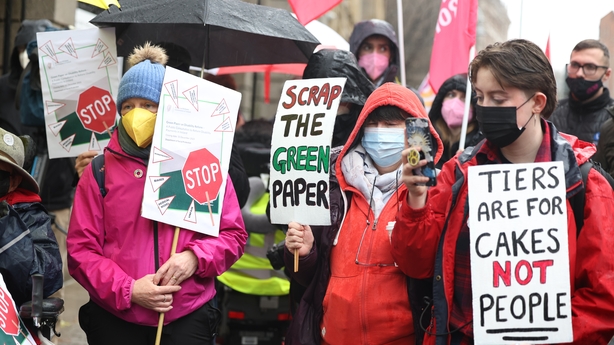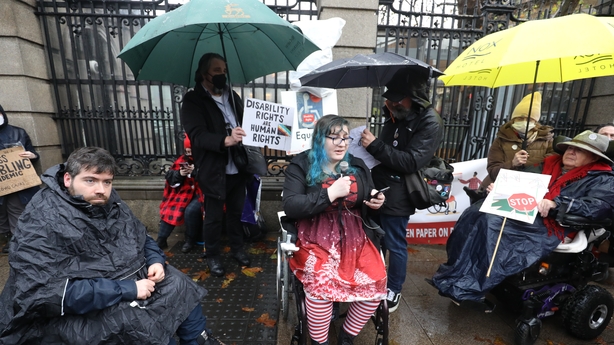A protest was held outside Leinster House this afternoon over a Government proposal to reform disability payments.
A Green Paper by the Department of Social Protection has suggested reforming the structure of long-term disability payments by establishing a three-tiered system.
A coalition of disabled people’s organisations have said the paper does not include proposals to remove societal barriers to employment such as improving workplace accessibility or disability equality training for employers.
The Department of Social Protection has pointed out that the Green Paper is about prompting discussion and debate to inform the final design of changes.

However, a suggestion in the paper that a person’s capacity to work will be medically assessed by people employed by the Department has caused dismay and concern among people with disabilities.
One activist has described it as “dehumanising and degrading”.
The Green Paper suggests a new model of long-term disability payments where the level of payment made to a person with a disability is calculated based on the nature and impact of their disability.
People with a capacity to work would be supported and incentivised through the Intreo public employment service to pursue and take up employment opportunities.
However, some disabled people and charity representatives have said their experience with Intreo has not been positive in the past.
Protesters said an estimated 84% of the disabled community will be required to engage with Intreo for training and employment.
The tiered system proposed by the Department aims to respond to findings of a study which was commissioned by the Government on the cost of disability in 2020.
The report by Indecon produced an estimated range of costs relating to the degree of a person’s disability.
They started at €11,579 and went up to €16,284, or between €9,282 and €14,513 using an econometric/equivalent standard of living approach.
‘Battle on a daily basis’

Clodagh Roche should be the ‘poster child’ of what is being proposed in the Green Paper, but despite working all her life, she is now homeless.
Ms Roche has had a hearing impairment since she was a child and acquired a visual impairment after getting measles at the age of four, but her parents kept her in mainstream school.
Nothing was going to stop her or make her different from her friends, so she worked from the age of 14 to buy her first hearing aids, which were extremely expensive at the time.
As she scrimped and saved and paid huge amounts for hearing aids over the years, Clodagh’s friends started reaching milestones.
It was at this point, she realised she was falling behind, and would never earn enough to buy her first car or get on the property ladder.
In recent years, she damaged her back which means she now has to use physical aids as she waits on a HSE operating list.
Acquiring a physical disability half way through her life has been very challenging.
While she has not worked since she injured her back, when Clodagh was in employment, the discrimination was blatant.

“I worked, but some of the jobs didn’t really kind of turn out as well as I’d hoped. I was told that in one job – we’re going to have to let you go because we need somebody here that can actually hear people.”
In the absence of employment, Ms Roche returned to university where she faced more battles.
“I really had to battle on a daily basis to have my voice heard and to try to work with other people and say this isn’t working for me. Lifts were constantly broken, lecturers wouldn’t give me notes.”
The response to her request for printed lecture notes was that the university did not do them on ecological/environmental grounds.
Despite working and making an effort to further her education, Ms Roche is now in homeless accommodation in Drogheda. She has been on the list for disabled housing with Meath County Council for 17 years.
“I’ve worked all my life. I’ve battled the system. And what the Government is proposing is that within two years, they will have a system set up and running whereby they are placing people with disabilities into a tiered system.
“If that’s not discriminatory, I really don’t know what to say about it, except that they’re taking the wrong approach and what they’re doing is they’re going to further push people into poverty, like myself”.
In a statement, the Department of Social Protection pointed out that the minister recently extended the timeframe for public consultation on the Green Paper by three months to March 2024.
It said it is trying to address “the twin challenges” of insulating people who cannot work from experiencing poverty; and promoting and supporting a higher rate of employment for disabled people.
It stressed that it was not a cost-cutting measure and that changes proposed, if introduced, would cost an additional €130 million each year.
“Nobody will lose their entitlement to a disability payment arising from the Green Paper proposals, nor will they see that payment level reduced. In addition, engagement with public employment services will be on a voluntary basis,” it said.
It said the Department “is committed to enhancing supports for people with disabilities”, and it highlighted a range of measures taken in the recent Budget, including the €400 Disability Support Grant, the extension of the Free Travel Pass, increased funding for the Wage Subsidy Scheme for People with Disabilities and an increase to all weekly payments. from January.
(This is an Article for RTE.ie. Here is the direct link to the article Disability payment reform will create ‘tiered system’ (rte.ie))
Post Disclaimer
We try to bring you news items that may be of interest to our readers. And while Cork CIL makes every reasonable effort to provide information that is as comprehensive, accurate and clear as possible, the information provided on this site is of a general nature. The news and stories shared on this page are often from third party organisations. The ideas and opinions expressed in these articles are those of the original authors and are not necessarily shared or promoted by Cork CIL. Responses to articles and queries about third party information should be addressed to the original author.


